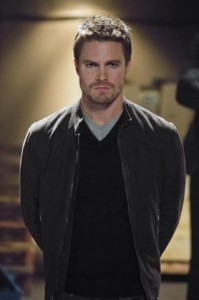Arrow Thursday: Protagonists
Since my obsession with Arrow doesn’t seem to be abating, I’m going to put up a post the day after the show airs for the rest of this season. I’ll try to talk about writing craft, but sometimes you just have to say, “Oliver, you dumbass, you deserve everything you’re going to get for that.” But first, this:
Community Rules: Treat everyone with courtesy and respect. Do not say somebody is wrong, say “I respectfully disagree.” Any comment that refers to anyone in a derogatory way is going to get trashed. Any comment in a sarcastic, snide, or demeaning tone will be trashed even faster. Any comment that refers to Oliver as a man-whore is okay.
Of course, the show isn’t coming back until Feb. 26, so maybe this is a good time to look at some of the major aspects of the story in general. Like, say, Our Protagonist, Oliver Queen.
Yeah, he’s kind of grim.
The Protagonist is the character who owns the story. His goals, his drives, his hang-ups, his screw-ups fuel the story. (He does not make the story, though; that’s the antagonist who shapes the narrative in the way he or she pushes back.) Therefore when designing a protagonist you need somebody who is . . .
• Fascinating (because he’s the guy we’re going to follow through the story)
• Flawed (because people who never make mistakes are not fascinating)
• Sympathetic or at least Understandable (which means he should not kick puppies or sleep with sisters)
• Vulnerable (gonna have to balance the abs-and-arrows with something that could kneecap him)
• Driven (has a strong goal he’ll die to achieve)
For the first episode, Oliver was pretty much abs-and-arrows, but that was needed to establish the baseline. On the island, he was mostly wimp-and-whine, but that was good, too; it showed how far he’d come in five years. Leaving Oliver to grim fortitude, however, was going to make viewers turn the channel, which in fact many of them did. So the key with protagonists is to establish them in their stable lives quickly and then start throwing rocks at them, goading the protagonists to actions that will cross boundaries and change their characters or at least their expressions.
The problem was that, as a vigilante, Oliver was already crossing boundaries: he put on a hoodie at night and went around the city shooting arrows into rich people. After several episodes of this, it got old and kind of depressing. Meanwhile back on the island, Wimp-N’-Whine was changing and growing. It almost seemed as if the writers felt that Oliver’s growth on the island meant he didn’t have to grow in the present. They did try to throw rocks at him by giving him a really angry ex-girlfriend, but since that just made Oliver more stoic, it wasn’t a help. In order to get a protagonist out of his stable world, you need to get his attention, shock him awake so that he moves out of his rut and starts plowing new paths.
In the case of Arrow, Oliver met two people new to him, people he didn’t have history with, people he was going to have to establish new relationships with. The people from his old life automatically saw him as the old Oliver; new people didn’t have that to fall back on, so he had to readjust. It’s not surprising that it’s the new people–Diggle and Felicity–who see him as he really is; they don’t have any investment in who he used to be. New relationships mean new paths and–once Diggle and Felicity joined him in the bat cave–a new life with a new family. They were the catalysts who turned the story around because they turned Oliver around; if you trace Oliver’s character arc from the first episode to the present, the things that have had the most impact on him aren’t his best friend’s death and the earthquake machine; those things just made him grimmer. The big catalysts are Diggle and Felicity.
That means that when you watch Arrow, you get three Oliver Queens: the old Oliver on the island, the new Oliver pretending to be the old Oliver in Starling City, and Arrow, the hero who works with Diggle and Felicity to save the city. Oliver does pretty well when he keeps those three identities separate, its when he gets them confused that people tend to say, “Oliver, you’re an idiot.”
Even so, he’s a great protagonist: driven, active, skilled, sympathetic (mostly), vulnerable because of his connections to people, and constantly evolving. He makes mistakes which is important in a hero-protagonist–you don’t learn if you don’t make mistakes–he generally cleans up after his mistakes, also important in a hero-protagonist; he admits others to his secrets and treats them as equals; he evolves a kind of moral code (he really is trying to stop killing people); he interacts with family and friends and doesn’t consider himself above them; and he’s not good at everything, which makes him a lot more human. Some of Oliver’s best moments are when he’s unsure: asking McKenna out on a date, telling Felicity that he needs her, trying to endorse his mother for mayor right after he’s learned that she’s a liar and a cheat. He also has a dry sense of humor that offsets all the grim, and he’s content to be a straight man for the more mercurial members of the cast, confident enough in himself not to demand the spotlight. There’s a reason this show is so popular, and about half of it is because Oliver Queen is a great protagonist.
Now if he’d just quit doing sister acts . . .
Bonus: Here’s a short history of the Green Arrow in comics.

 newest »
newest »





Wonderful bog post BTW. I enjoyed it and can totally understand what you're saying.